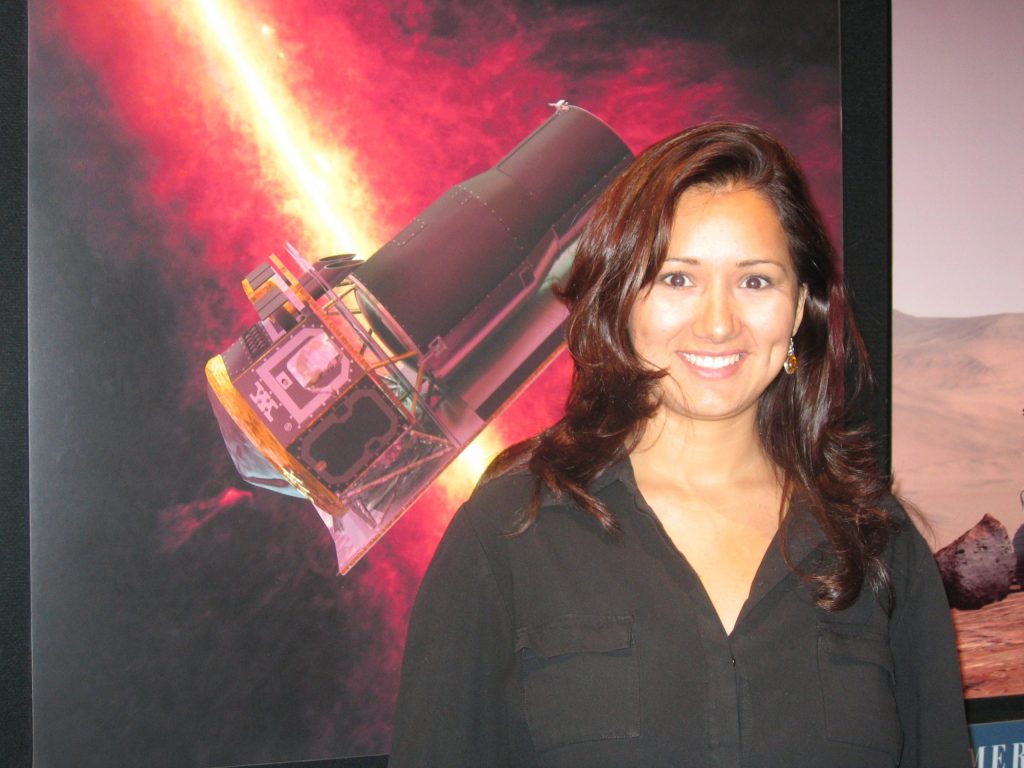
Access this Article in a different format:
For the past 18 years, Moorpark College professor and scientist Farisa Morales has been an integral member of the Spitzer Space Telescope family. Now, after 16 years of fascinating observations and stunning photographs, Spitzer’s expedition ended on Jan. 30. On Spitzer’s final day, Dr. Morales was stationed in NASA’s Jet Propulsion Laboratory operation “dark room” as she led the end of mission activities, narrating and delineating plans being sent to Spitzer as the telescope was put into safe mode.
Although Spitzer’s mission is over, Morales is diving into a new beginning. She says, “We have a huge archive that is waiting to be mined. Its revelations have already been tremendous and revolutionary… only time will tell what is Spitzer’s greatest legacy.”
Morales, who teaches in MC’s physics and astronomy department, works in one of NASA’s most prestigious divisions. But what exactly does she do? She researches the thermal emissions—heat—from dust grains orbiting other stars close to the sun that are currently forming their own planetary systems. This research provides insight into the dust’s chemical composition, as well as the architecture of the newly formed planetary system. The team made an interesting discovery: the presently forming planetary systems are more similar to our own than previously speculated.
Morales decided she wanted to pursue a STEM career while attending Los Angeles Mission Community College. But it was not until after transferring to UCLA as a math major that she found her passion. Morales landed an internship at JPL and from there her interest bloomed. She became an astrophysics major, inspired by the space exploration happening at NASA and fantasizing about her future there.
Morales split her time between academics and working at the laboratory and was ultimately embraced by the Spitzer Space Telescope family. While working hard with the team to unveil the mysteries of the universe, Morales completed her bachelor’s degree at UCLA, master’s degree at CSUN and doctorate at USC.
The majority of her classmates in school were male and now so are her colleagues. “Being a female in a male-dominated field can be a little odd, but that provides me with yet one more reason to persevere and stick with it. Being a female in a male-dominated field has not been the only parameter that made me different since I set on this path; I also became the mother of two, Natalie and Mark, before even starting at the community college.”
Success came from setting up workable weekly schedules and planning around her kids’ schedules. “My goal was to graduate with my doctorate by the time my daughter, Natalie, began college, and we did it!”
Morales passes on her perseverance and optimism to her students at MC and advocates for her female students especially, telling them to continue to chase the future they want for themselves. For the past 5 years, Morales has brought MC students to intern at JPL with her, using Spitzer data.
Her students are undoubtedly inspired by her cosmic wisdom. “No one can know exactly where you’ll end up, but keep pushing in some broad direction you have interest in and may have envisioned for yourself.”
She added, “Ten years will go by at the same rate. I asked myself, ‘How would you like it, with or without a degree? With a degree I figured, it would improve my chances of doing something interesting and enhance the life of my children.”
See Dr. Morales talking about the Spitzer Space Telescope.
Lauren Rosenthal is a Moorpark College student and intern with the Ventura County Community College District.
